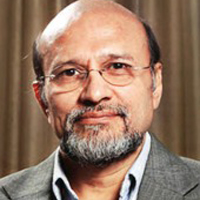Mehrotra Santosh
Santosh Mehrotra is a human development economist, whose research and writings have had most influence in the areas of labour, employment, skill development, child poverty, and the economics of education.
He was an economic adviser in the United Nations system in New York City, Italy, and Thailand (1991–2006), and technocrat in the government of India (2006–2014), apart from making contributions to academic research since the mid-1980s. He has also in recent years established a reputation as an institution-builder in the field of research in India, despite facing difficult odds. He brings a combination of professional experience: with the Indian government as a policy maker and adviser, with international organisations as a technical expert, having lived on three continents and travelled to 63 countries providing technical advice to governments; and as an academic whose research work has been translated into French, Spanish, Portuguese, Italian and German. Mehrotra was the son of an officer of the Indian Administrative Service. He had most of his early education in schools in Lucknow, including the historic La Martiniere College. He finished his schooling in Allahabad, the university town. His mother, herself a poet in Hindi, from Allahabad, had grown up surrounded by stories of the nationalist movement against the British, and both parents imbued him with a deep sense of nationalism. She was the daughter of a distinguished lawyer, who was Mayor of Allahabad. Her father, KP Kakkar had defeated Motilal Nehru, in the city elections to the Mayor-ship in 1922.
After Mehrotra graduated from Allahabad University, his father expected him to join the Indian Administrative Service. However, he wanted to become an academic and won two fellowships to study abroad, first to obtain a master’s degree in Economics at The New School for Social Research, New York city. Here he was taught by well-known economists, like Edward J. Nell, Robert Heilbroner, Ross Thomson, and Gita Sen. Mehrotra then moved to Cambridge University to do a PhD in Economics.
Finishing the PhD in 1985 he returned to India to a life in academia. In 1988 he became Associate Professor, School of International Studies, Jawaharlal Nehru University, New Delhi.
In 1991, Mehrotra was called away to the United Nations system in New York. From 1991 to 2006, he spent 15 years with two UN agencies – UNICEF[3] and UNDP. In the latter, he was the chief economist of the global Human Development Report (2002–05), New York. Before that he led the research programme on developing countries at UNICEF’s global research institute, the Innocenti Research Centre, Florence, Italy (1999–2002).
After an international career, he left the UN to return to India in September 2006 to head the Rural Development Division of Planning Commission (India), where he was also the Economic Adviser for the Social Sectors. He then headed Development Policy Division, Planning Commission (till August 2009).
He was Director-General, National Institute of Labour Economics Research (earlier called Institute of Applied Manpower Research[, Planning Commission (in the rank of Secretary, Government of India till August 2014.
He also held a three-year appointment as Parkin Visiting Professor at the Centre for International Development in the Faculty of Social Sciences, at the University of Bath, UK (2010–13). Mehrotra has also shown through his research that the government commitment to skilling 500 million people between 2012 and 2022 is based on an incorrect estimate, and the government’s instruction to its ministries to plan skill development capacity accordingly risks wasting resources. He showed that the numbers to be skilled over 10 years was only about 200 million, a daunting enough task.
Mehrotra is currently Professor of Economics, Centre for Informal Sector and Labour Studies, Jawaharlal Nehru University, having returned to his alma mater.
Publications: .Written or edited 11 books, which are taught in universities around the world:
Seizing the Demographic Dividend. Policies to Achieve Inclusive Growth in India (Cambridge University Press, 2015);
India’s Skills Challenge: Reforming Vocational Education and Training to Harness the Demographic Dividend, ed. (Oxford University Press, 2014;
Land Policies for Growth with Equity:Transforming the Agrarian Structure in Uttar Pradesh (Sage, 2014);
Countering Naxalism with Development: The Challenge of State Security with Social Justice (Sage, 2014).
Development with a Human Face.Experiences in Social Achievement and Economic Growth (Clarendon Press, 1997 and Oxford, 2000);
Le Developpement a Visage Humain, Economica, Paris, 2001;
The Economics of Elementary Education in India, Sage Publications, 2006;
Universalizing Elementary Education in India. Uncaging the Tiger Economy (Oxford, 2005);
Asian Informal Workers. Global Risks, Local Protection (Routledge, London, 2007), and
Eliminating Human Poverty: Macro-economic Policies for Equitable Growth (Zed, London, 2007).
India and the Soviet Union: Trade and Technology Transfer, Cambridge University Press, 1990).

Mehrotra Santosh
Date of Birth: 30 Jul 1955
Birth Place: Lucknow
Proffession: Economist
Nationality: Indian


